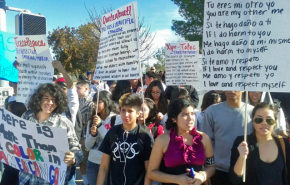A law to silence dangerous ideas
Knowledge is power--which is precisely why Arizona doesn't want Latino students to learn about their own heritage, reports .
"TEACHING IS a political act." So says Jose Gonzalez, who teaches sixth graders in the Tucson Unified School District (TUSD) in Tucson, Ariz. He recently spoke at Smith College in Northampton, Mass., regarding the obstacles facing Latino/a youth in the U.S. and how teaching can be one part of the process of forging critical consciousness and resistance.
He challenged the room full of college students he was addressing to list reasons why teaching itself is inseparable from social and political issues. A few hands were cautiously raised. Gonzalez sprang into teacher mode, calling on students, repeating their answers and challenging their assumptions.
The group collectively arrived at the conclusion that knowledge is power--and that teachers who do not go outside a textbook make a choice to be silent rather than to challenge the reality of their students.
Gonzalez is one of several teachers profiled in the moving documentary Precious Knowledge, which looks at the TUSD's banning of ethnic studies courses in early 2012. These courses, which included English, history, art and government, were taught from Latin American and Chicano viewpoints and sought to engage Latino students with their history and culture, as well as to approach traditional subjects from new perspectives.

More importantly, these courses sought to foster critical consciousness in students, following the methodology of radical educators like Paulo Freire, who stressed the importance of relating curricula to students' everyday lived experiences, as well as collapsing the hard distinctions between teacher and student.
Despite improving student performance and graduation rates, the ethnic studies program faced harsh criticism from State School Superintendent John Huppenthal, who called the courses one-dimensional and a form of indoctrination. He invoked the language of multiculturalism, saying, "What we want to do is create a society in which everybody is working for a better tomorrow, not working to get even."
"I've heard different theories--like they want to keep the mexicanos with the least amount of education so they can be perpetually taken advantage of," said Gonzalez. "Another theory is that because our numbers are so high, there is a fear among older generations--European Americans--that we're going to take power, and then they're going to lose their status in society, so these classes have to be destroyed. But I just think that it was racism--and that politicians are demagogues. They use that to get elected."
INDEED, AROUND the same time that Arizona passed its notorious SB 1070 that legalized racial profiling of Latinos in Arizona, the state legislature also passed HB 2281, which was the bill banning ethnic studies. Specifically, it outlawed courses that advocate the overthrow of the government, resentment toward a certain race or class, or ethnic solidarity. So while one law sought to control the physical bodies of Latinos, the other bill sought to control minds.
Facing a cut in funding of $14 million under the terms of HB 2281, the TUSD board voted 4-1 in January 2012 to kill its ethnic studies courses. Students and teachers resisted, engaging in civil disobedience and protests (students chained themselves to board members' chairs to prevent the vote). A lawsuit that challenges the legality of the ban is pending in a federal court.
For Gonzalez, the ban on ethnic studies is only the sharpest edge of the many problems with public education in the U.S. For example, Gonzalez also thinks that the standardized testing frenzy is misguided. "I don't believe in standardized tests," said Gonzalez. "I think that it's a form of educational malpractice to teach to a test. We [need to] focus on their human measures for our students: developing a sense of purpose, hope, positive identity, resistance, resiliency."
Gonzalez supported the strike by teachers in Chicago last fall. "Things are crazy in Chicago," he said. "The idea that board members are appointed by the mayor is...fascist. I was happy that they were strong enough to walk out and to strike...Until we start as a society going back to that and striking and demanding our human rights, we're going to keep getting what we have, which is nothing."
Meanwhile, Jose Gonzalez is teaching sixth grade psychology; he isn't allowed to teach history or Mexican-American studies. A banned book list for the district includes Pedagogy of the Oppressed by Freire, Race Matters by Cornel West and A People's History of the United States by Howard Zinn.


